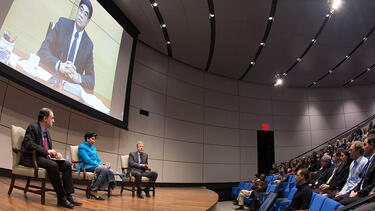Are CEOs Brands?
If you hear the names “Steve Jobs,” “Jamie Dimon,” and “Warren Buffett,” you’ll probably think “Apple,” “JPMorgan Chase,” and “Berkshire Hathaway.” A CEO’s image can become almost inseparable from the company he or she leads.

In a panel discussion at Business + Society, a conference celebrating the opening of Edward P. Evans Hall, three CEOs of Fortune 500 companies gave their thoughts on what this convergence of individual and corporate identity means for them and their ability to move their companies forward.
The talk was titled “Bosses as Brands,” an acknowledgment of the complexity of the relationship between a public-facing CEO and the company. Moderator Jeffrey Sonnenfeld pointed out that a brand functions as a shorthand for a very complex set of ideas and experiences associated with a product or company. In the same way, the CEO, by name and face, can become shorthand for the company. A brand is a powerful tool for communication and motivation. But a brand, when applied to a person, is also reductive and potentially limiting.
PepsiCo CEO Indra Nooyi described taking on the mantle of brand as possibly an unavoidable part of the CEO role. “When you become a CEO you’re no longer your own person, you’re a public property,” she said. To some extent, she said, this phenomenon is as a condition imposed by the expectations of the media, investors, and other constituencies. But she also argued that a CEO can take control of the public’s conflation of human being and multinational corporation to advance the company’s strategy. When, she first become CEO, she said, she recognized the power and demands of her public persona. What kind of a company do I want PepsiCo to be?” she asked herself, and resolved to shape her image to be “completely intertwined” with that version of PepsiCo.
This thought process led to the Performance with Purpose initiative, which brings considerations of the corporation’s role in society to how the corporation makes its money. Nooyi described Performance with Purpose as both a strategy for corporate growth and as an outgrowth of her personal commitments. “I decided to make it my personal mission.”
Jeffrey Bewkes, the head of Time Warner Inc. since 2008, argued for a view of the CEO as a salesman. He pointed out that Time Warner’s position is different from PepsiCo’s in that the main company has little brand presence, and instead the emphasis is on the products—including movie characters, cable channels, and news publications. He also emphasized some of the internal aspects of leadership, including setting and renewing strategy and putting the right people in place. Nonetheless, the CEO as salesman at a minimum implies a facility with communication and relentless promotion of the product, and over the course of the conversation, Bewkes didn’t pass up an opportunity to extoll his brands, whether HBO, CNN, or Superman.
Chengyu Fu, the chairman of Sinopec, China’s largest refining company, spoke about his role in building relationships with companies outside China. “We can’t do anything by ourselves. We have to work with all kinds of companies and partners, so you have to be trusted.” He pointed out that China is in the midst of rapid change, as large companies shift from being state-owned to private, populations move into cities, and the economy opens to more international markets. In this situation, getting to know partners, and really understanding the businesses and culture on the other side, can produce improved outcomes for all sides. CEOs, he said, can play a role by continuing to learn and building mutual understanding.